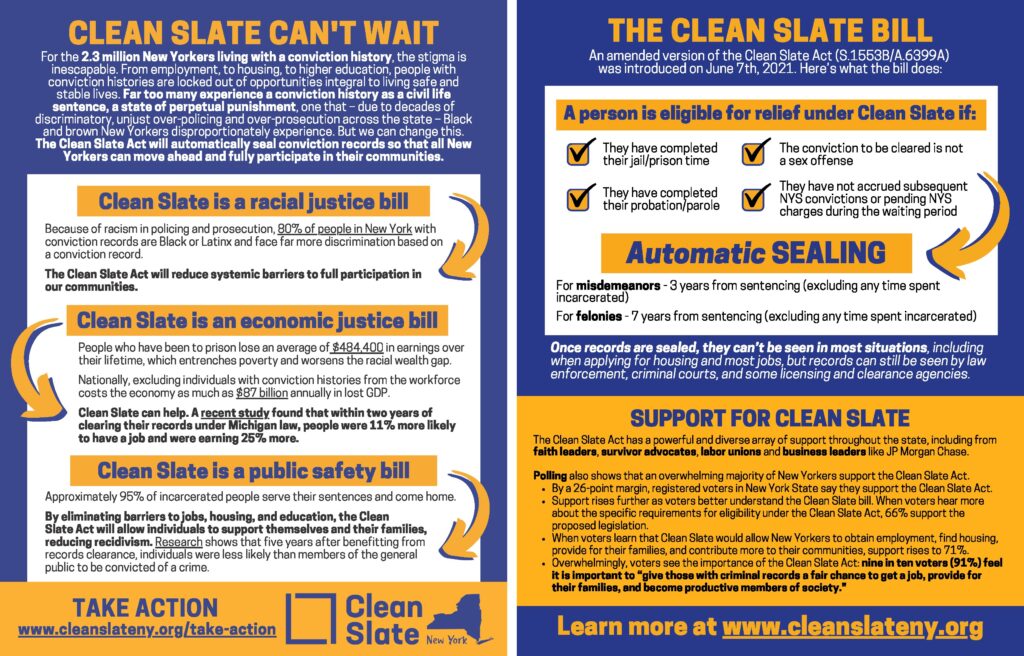“Clean Slate” Would Automatically Clear Criminal Records in New York
PLEASE NOTE: Our office has received a number of calls regarding the Clean Slate Act. This blog is about a proposed law that was not yet in force. The Clean Slate Act has now been signed into law, and will go into effect in November 2024.
The Clean Slate Act has been proposed to the New York State senate and assembly (S.1553A/A.6399). What would the bill do? It would provide for automatic sealing of certain criminal convictions after a statutory waiting period.
How the Clean Slate Act Would Work
The Clean Slate Act would amend various sections of New York law. It would allow for the automatic sealing of certain criminal convictions. Click the info-graphic below to learn more.
The state legislature returns to session in January 2022 to consider the bill.
Justification for the Clean Slate Act
Once an individual’s “debt to society” is paid, justice demands that the individual not be punished further in connection with employment, housing, obtaining credit, and many additional areas essential for successful participation in one’s community. This Act will provide such individuals with a Clean Slate to move on with their lives and not be punished in perpetuity. It aims to end perpetual punishment by requiring the expungement of certain records subject to a variety of conditions and exceptions, making it illegal and a violation of Human Rights to unlawfully disseminate any information that has been expunged.
– Text of Proposed Bill
Over 70 million Americans have a criminal record, and 2.3 million of them are New Yorkers. According to the Campaign, convictions keep people from opportunities like employment and housing. There are also statistics which suggest that convictions disproportionately affect communities of color. As many as 80% of those in New York with criminal convictions are people of color.
The Clean Slate Act could help strengthen communities by ensuring access to employment and housing. Moreover, it could help strengthen the economy. One study found that within two years of having a criminal record cleared, people were 11% more likely to have a job and were earning 25% more.
While New York passed a law in 2017 to allow for the sealing of convictions, the Campaign says this hasn’t done enough. Less than 1% of those eligible have been able to have their convictions sealed.
Whole-Sale Exception for Sex Offenses
Despite the absence of any evidence that they re-offend at higher rates, those convicted of sex offenses are excepted from the Clean Slate Act. This means that they can never have their convictions sealed.
Moreover, it appears from the text of the bill that those who are required to register as a sex offender cannot have other convictions sealed. And this is even if the other conviction is not a sex offense.
Yet in New York’s bill, there is no justification for such exceptions. In reality, data shows recidivism for those who have committed sex offenses is quite low. In fact, statistics show that those convicted of sex offenses are much less likely than people convicted of other offenses to be re-arrested or go back to prison.
References:
- New York 2021-2022 Legislative Session, Senate Bill S1553B, “Relates to the automatic sealing of certain convictions.” Available at: https://www.nysenate.gov/legislation/bills/2021/s1553 (last accessed Oct. 26, 2021).
- Clean Slate NY Campaign. Available at: https://www.cleanslateny.org/ (last accessed Oct. 26, 2021).
- Jacob Kaye, “Advocates renew push for Clean Slate,” Queens Daily Eagle (Oct. 8, 2021). Available at: https://queenseagle.com/all/advocates-renew-push-for-clean-slate (last accessed Oct. 26, 2021).

